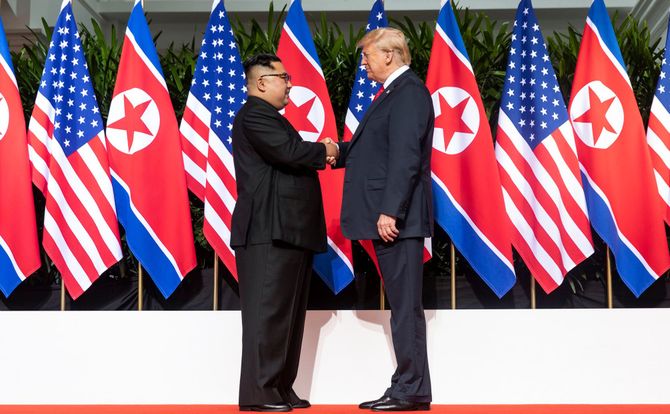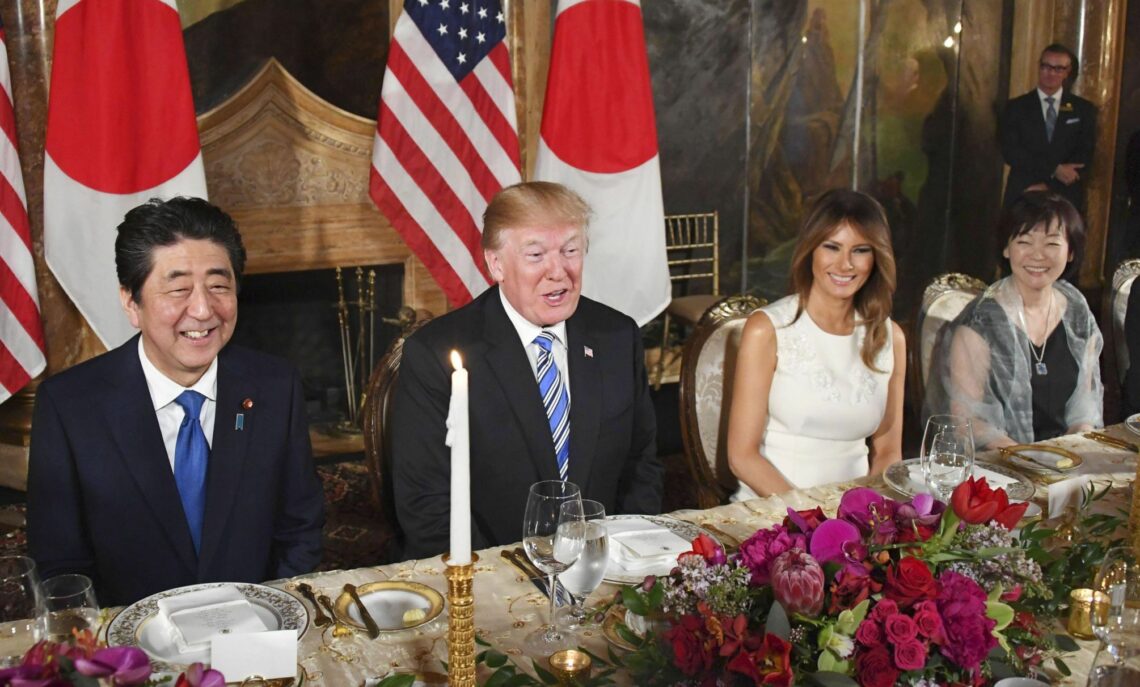The Trump-Kim summit: Japan’s perspective
The effects of the Trump-Kim summit in Singapore are still reverberating in Japan. As the geopolitics in the region shift, it could cause new tensions that the country needs to handle. Its concern is what concessions the Trump administration may give to China for its part in bringing Kim Jong-un to heel.

In a nutshell
- The Trump-Kim summit has set off big changes in the geopolitics of the Far East
- Japan is not well-placed to deal with these disruptive shifts
- U.S. concessions to China could negatively impact Japan’s security
After his historic May meeting with Kim Jong-un in Singapore, United States President Donald Trump said that North Korea no longer poses a nuclear threat. While that claim is obviously false, the summit did contribute to a substantial decrease of tensions in the Far East.
It is important to remember that the situation on the Korean Peninsula at the beginning of this year was very grim. Many feared that an armed conflict was imminent. The U.S. considered evacuating families of its military personnel living in South Korea. Japanese Prime Minister Shinzo Abe told the media his government was working on evacuation plans for the Japanese citizens living there. Rhetoric both in Pyongyang and Washington reached alarming crescendos. Since then, the situation has calmed significantly.
High stakes
The meeting held high stakes for many leaders in the region that were not in Singapore and not privy to the bilateral talks. These included not only Prime Minister Abe, but also South Korean President Moon Jae-in, Chinese President Xi Jinping and Russian President Vladimir Putin. All were, to varying degrees, involved in the preparations and consultations for the summit.
The exchange was most intense between Kim Jong-un and President Xi. In recent months, the North Korean leader has gone to Beijing three times. In good Confucian fashion, Mr. Kim has shown respect to Mr. Xi, not only due to the considerable age gap between the two leaders, but also the large discrepancy in power and status between the two countries.
To put it mildly, the Japanese foreign service is not the most skillful. Most Japanese politicians, even in very senior positions, are not known for their worldliness. Japanese prime ministers have typically had short-lived stints in power and spent most of their time keeping rivals at bay.
It is unlikely that Article 9 of the Japanese constitution will be abolished, making any changes to the dynamic in the Far East even more important to Japan’s security.
Prime Minister Abe is an exception. He has not only managed to stay in office much longer than almost all other Japanese heads of government. He has also shown an extraordinary interest in issues of foreign and security policies. Of particular importance is his initiative to normalize Japan’s defense policies by abolishing Article 9 of the Japanese constitution. That provision effectively limits Japan’s military power to its own shores. Such a change would require approval in a popular referendum, which for now is unlikely. This makes any changes to the dynamic in the Far East even more important to Japan’s security.
U.S.-Japan relations
Prime Minister Abe showed a strong affinity for Mr. Trump as soon as the latter won the U.S. presidential election. He even met the president-elect before his inauguration and has since been a welcome guest in the White House and at Mr. Trump’s Mar-a-Lago resort in Florida.
Japan is certainly the U.S.’s most valuable Asian ally. It hosts a number of American bases, and the Okinawa archipelago holds huge strategic significance for the U.S. Like Taiwan in the words of General Douglas MacArthur, Japan serves as an “unsinkable aircraft carrier.” It demonstrated great value for the American forces fighting in the Korean War.
Unlike other allied leaders who have fallen out with President Trump, Prime Minister Abe seems to have kept up a good rapport with him. Compared to China, Canada and Germany, Japan has come under attack considerably less over its trade surplus with the U.S.

However, Japan is also reeling from the effects of President Trump’s “America First” policy. The U.S. has abandoned the Trans-Pacific Partnership, on which Prime Minister Abe had spent a huge amount of his political capital.
For years, Washington had been insisting on Japan doing more to defend itself. Under President Trump this has intensified, although in monetary terms Tokyo is largely covering the expenses connected with the American bases in Japan.
Shifting tectonic plates
With the Singapore summit, the focus has been on North Korea giving up its nuclear arsenal. Alongside this, there are the issues of establishing diplomatic relations between Washington and Pyongyang, and a potential peace treaty between the two Koreas, ending the state of armistice that has lasted since July 27, 1953.
Tokyo has been pressing Pyongyang on one particular issue: Japanese citizens abducted by North Korean agents between 1977 and 1983. The Japanese government claims that 17 people were kidnapped. Prime Minister Abe made it clear that this issue will figure prominently on the agenda during forthcoming negotiations about the normalization of the Korean Peninsula.
From a humanitarian point of view, this issue is important. But when it comes to the larger issues of security in the Far East and Indo-Pacific region, it is of marginal relevance. Since the Singapore summit, Mr. Kim has received a lot of attention from abroad. President Putin has extended an invitation for him to visit Russia. Prime Minister Abe, too, has expressed his interest in meeting him.
Japan cannot control the dramatic power shifts that will come with China’s rise.
Many tectonic plates in the complex East Asian security architecture have started to move. This process will probably accelerate. When tectonic plates start shifting, they cause earthquakes and new fissures. In this respect, it is worrying that there is no regional security architecture and that history still weighs heavily on relations between China and Japan, as well as the two Koreas and Japan.
These realignments are further complicated by the huge issue of Japan’s security. It is well-known that Japan’s population is shrinking and aging rapidly. This has political implications. Older people tend to hold more conservative views. They prefer the status quo over innovation.
Japan seems capable of dealing with the technological, social and fiscal implications of an aging population. But it cannot control the dramatic power shifts that will come with China’s rise at the same time. China’s economic strength surpassed Japan’s several years ago. Recently, Beijing has substantially beefed up its military. It has also expanded its influence by bolstering its claims to the South China Sea and investing heavily in other countries, most notably in Southeast Asia and Africa.
Japan will increasingly be unable to keep up with the Chinese. Its security alliance with the U.S. will therefore become more and more important to shield it from an overbearing China.
Enter President Trump and his “America First” policy. Will the U.S. really stand by Japan as firmly as had been presumed in the past, most notably during the Cold War? Many Japanese doubt that Washington would enter a war with China if it came into conflict with Japan over, for example, the disputed Senkaku Islands.
The Singapore summit gives cause for substantial skepticism about the U.S.’s reliability.
The Singapore summit gives cause for substantial skepticism about the U.S.’s reliability, at least under the present administration – and even beyond, if the “Pax Americana” continues to erode. President Trump wanted the summit and willed its outcome. There was no room for even a shred of skepticism, as the Japanese would have liked. A major agreement over the Korean Peninsula could see Washington withdraw or at least substantially reduce its military presence in South Korea. This could put the future of U.S. military bases in Japan in question.
The price Trump pays
Tokyo’s immediate concern must be the question of what price President Trump is paying for the substantial efforts China, and in particular President Xi, has made to get the Trump-Kim summit to take place. Tokyo knows that Washington’s dealings with Beijing are not compartmentalized. The U.S. could make concessions to China that compromise Japan’s security.
Recently, bilateral relations between Beijing and Tokyo have improved. After a period of top Chinese leaders avoiding top Japanese politicians, there is renewed interest in high-level meetings. In May, Chinese Prime Minister Li Keqiang visited Japan. It looks likely that in 2019 President Xi will visit as well. The Asian Development Bank (largely controlled by Japan) and the Asian Infrastructure Investment Bank (under Chinese control) have agreed to cooperate. With the U.S. on a protectionist course, China has an increased interest in bilateral economic relations with Japan.
Most Japanese experts agree that President Trump was outwitted by Kim Jong-un and that the North Koreans got more from the Singapore summit than the U.S. did. Despite the harmful trade spat with the U.S., China facilitated the realization of the summit and thereby gave a big boost to President Trump’s ego.
Beijing may not expect Mr. Trump to show political gratitude. It is enough that the Chinese have gained close insight into the workings of the Trump administration. The impression must have been devastating and a fillip to China’s nationalist hardliners. In the Japanese view, if the U.S. administration can be taken for a ride by an impoverished, third-rate country, the Chinese will have a field day in their dealings with Washington.
This is Japan’s biggest worry. Washington might hand over influence to the Chinese without getting anything in return – and such concessions might be difficult to put right later, when Chinese power is even stronger. From Tokyo’s perspective, this poses grave challenges in the South China Sea, Southeast Asia and the Indian Ocean, all of which are vital for Japan’s economy.








